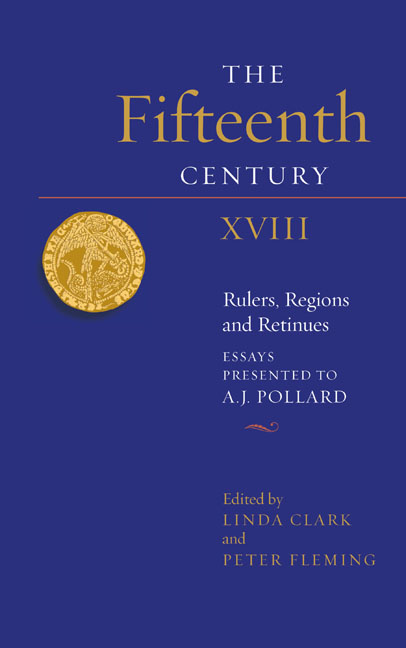England, 1461: Predominantly Provincial Perspectives on the Early Months of the Reign of Edward IV
Published online by Cambridge University Press: 24 November 2020
Summary
To the citizens of London, the accession of King Edward IV on 4 March 1461 marked a fresh start. There is no reason to doubt that many of the citizens (not least those who had invested heavily in the new dynasty even before it had secured the throne) shared the sentiment of a popular verse which – according to the author of Gregory's Chronicle – had currency in the streets of London in the days between the second battle of St. Albans on 17 February and Edward's proclamation as King: ‘Lette us walke in a newe wyne yerde, and lette us make us a gay garden in the monythe of Marche with thys fayre whyte ros and herbe, the Erle of Marche.’ The city, still smarting from its shelling by the Lancastrian defenders of the Tower in the previous year, and relieved at having been spared a sacking at the hands of Queen Margaret's northerners, might well set its hopes on a new regime. Whether Englishmen elsewhere – perhaps with the exception of the active retainers of the house of York – shared this sentiment is less clear. Arguably, to large parts of the country, the accession of an inexperienced eighteen-year-old prince, however attractive to look at, made little difference. Indeed, it is tempting to speculate whether dimly remembered provincial traditions found reflection in William Shakespeare's great cycle of histories, where King Edward's accession and coronation are curious non-events, the former merely alluded to towards the end of act 2, scene 1 of the third part of King Henry VI, the latter taking place off-stage while theatre-goers seek refreshment in the bar between acts 2 and 3. The Bard might have celebrated his dramatic triumphs on the outskirts of the capital, but he himself hailed from provincial Warwickshire.
Modern scholarship has by and large refused to take the Londoners’ purported enthusiasm at face value, and has recognised that even the crushing Yorkist victory at Towton was at best the end of the beginning. While much emphasis has naturally been placed on the set-piece rooting out of the Lancastrian resistance in the northern and western strongholds, there has also been recognition of the very real tension in the localities in other areas of the kingdom.
- Type
- Chapter
- Information
- The Fifteenth Century XVIIIRulers, Regions and Retinues. Essays presented to A.J. Pollard, pp. 81 - 92Publisher: Boydell & BrewerPrint publication year: 2020



